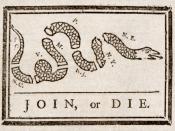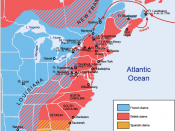Who really should have won the French and Indian war? France and Britain engaged in a succession of wars in Europe and the Caribbean at several intervals in the 18th century. Though Britain secured certain advantages from them -- primarily in the sugar-rich islands of the Caribbean -- the struggles were generally indecisive, and France remained in a powerful position in North America at the beginning of the Seven Years War in 1754.
By that time France had established a strong relationship with a number of Indian tribes in Canada and along the Great Lakes, taken possession of the Mississippi River and, by establishing a line of forts and trading posts, marked out a great crescent-shaped empire stretching from Quebec to New Orleans. The British were confined to the narrow belt east of the Appalachian Mountains. The French threatened not only the British Empire but the American colonists themselves, for in holding the Mississippi Valley, France could limit their westward expansion.
An armed clash took place in 1754 at Fort Duquesne, the site where Pittsburgh, Pennsylvania, is now located, between a band of French regulars and Virginia militiamen under the command of 22-year-old George Washington, a Virginia planter and surveyor.
In London, the Board of Trade attempted to deal with the conflict by calling a meeting of representatives from New York, Pennsylvania, Maryland and the New England colonies. From June 19 to July 10, the Albany Congress, as it came to be known, met with the Iroquois at Albany, New York, in order to improve relations with them and secure their loyalty to the British.
The delegates also declared a union of the American colonies "absolutely necessary for their preservation," and adopted the Albany Plan of Union. Drafted by Benjamin Franklin, the plan provided that a president appointed...


